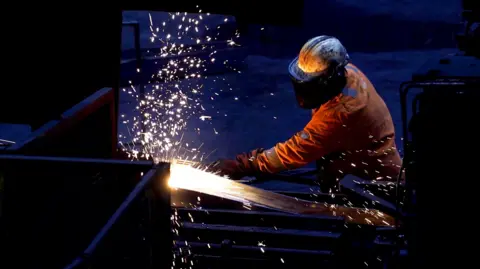On June 16, 2025, British Steel announced a significant achievement by securing a five-year contract valued at £500 million to supply train tracks for Network Rail. This important development highlights the company’s integral role in the UK’s railway infrastructure and its future sustainability. The contract entails the production of over 337,000 tonnes of track, which will significantly enhance the operational stability of the Scunthorpe steelworks, one of the last plants in the UK producing virgin steel. This deal not only provides assurance for the workforce at Scunthorpe but is also a crucial step in reinforcing British manufacturing capabilities, particularly in the steel sector.
This new contract comes during a transformative time for British Steel, which was brought under government control in April 2025 after its previous Chinese owner, Jingye, was accused of contemplating operations that could permanently shut down vital facilities like the blast furnaces. The implications of potentially ceasing such operations raised national security concerns regarding the UK’s ability to produce steel. The government’s proactive intervention in taking control of British Steel aimed to avert any risk to the national steelmaking capability.
British Steel’s statement regarding the new contract reflects a renewed confidence in UK workers and industry. The company has been a longstanding provider of rail tracks in Britain, with its Scunthorpe plant producing rail effectively since 1865. The substantial contract ensures a continued flow of work for this facility, which will enable British Steel to meet approximately 80% of Network Rail’s track requirements. Meanwhile, other European steelmakers will supplement supplies with specialist rail products.
Clive Berrington, the director for railway business services at Network Rail, emphasized the organization’s commitment to sourcing materials from British suppliers when economically feasible. He expressed confidence that British Steel remains competitive in the rail supply sector, ensuring its continued status as a primary supplier in the coming years. The sentiment was echoed by British Steel’s commercial director, Craig Harvey, who articulated the firm’s vital role in the UK’s economic landscape and infrastructure.
The takeover of British Steel by the government was characterized as a temporary measure, with future discussions surrounding potential private investments still on the table. This strategic decision arises from the urgent need to safeguard the UK’s steel production capabilities, particularly following the fallout from failed negotiations with Jingye. The closing of blast furnaces raised concerns about the availability of virgin steel production, which involves an intricate process of extracting and purifying iron from its raw state—a crucial element for major construction, including rail systems.
The Scunthorpe facility is notable as it employs around 2,700 people, operating four blast furnaces named after English queens: Bess, Mary, Anne, and Victoria. Currently, two of these furnaces—Bess and Anne—are operational. With the backdrop of uncertainty regarding the UK steel industry, especially in light of earlier closures, such as that of Port Talbot’s operations, maintaining the functionality of Scunthorpe’s plant is paramount for national infrastructure resilience.
Transport Secretary Heidi Alexander is slated to visit Scunthorpe shortly to underscore the contract’s positive implications for both British Steel and the UK’s broader economic growth strategy. The government’s push to bolster domestic manufacturing aligns with an upcoming national infrastructure strategy, aiming to secure the country’s industrial foundations.
This recent contract with Network Rail is a significant step forward amid ongoing challenges, including external trade factors such as US tariffs that threaten to undermine UK steel businesses. The government’s efforts to enhance national steel production, while simultaneously exploring private investment avenues, illustrate the complexities and stakes involved in securing a sustainable future for the UK steel industry and its workers.



